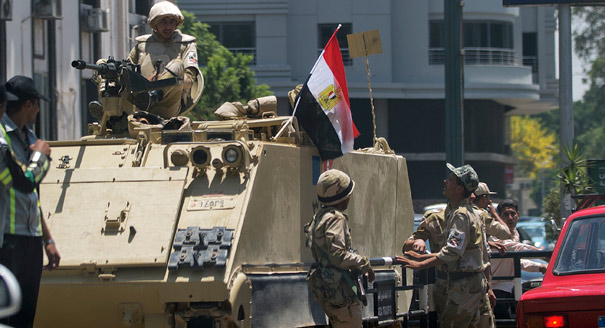In Egypt, Catherine Ashton, the EU’s foreign policy chief, is facing a highly complex diplomatic challenge.
How she deals with it will have immense implications for Europe’s long-term credibility and strategy toward the country and the Arab world.
Her trusted expert on this issue is Bernardino León, who holds the title of EU special representative for the Southern Mediterranean region. In a rare interview, León told Carnegie Europe about the EU’s profound worry over Egypt’s increasingly divided and violent society.
Even if Egypt’s military has imposed a semblance of order since last month’s coup against the Islamist president Mohamed Morsi, León said the EU’s greatest fear is the deep split running through Egyptian society. Diplomats say this has the potential to erupt into civil war.
“The military need to understand just how big the divide is in Egypt. The issue is how to overcome that polarization,” León said.
The Obama administration along with Israel, Saudi Arabia, Qatar, and Libya take a different view. They are vastly relieved that the military are back in the saddle, suppressing the Muslim Brotherhood. Washington believes—or rather, hopes—that this heralds the return of a stable, pro-western Egypt that is friendly toward American and Israeli interests.
But Ashton and her team believe that the kind of stability promised by Abdel Fattah el-Sisi, Egypt’s de facto leader, is delusional. It could sow the seeds of its own destruction.
Sisi was Egypt’s defense minister under Morsi, the Islamist president and Muslim Brotherhood leader who was toppled by the military on July 3, 2013.
Sisi has since reintroduced a state of emergency and arrested many of the Muslim Brotherhood’s leaders. Even though this crackdown has cost hundreds of lives, many liberal and secular Egyptians support him. What they want is stability.
Ashton and León, who have invested a huge amount of time and effort in Egypt since early 2011, also want a stable Egypt—but not Sisi-style.
“The kind of order that the military is imposing is not real order. It’s a short-term order,” León said in the Carnegie interview. “They fail to see the long term.”
The short-term stability in Egypt is being bankrolled by Saudi Arabia, Kuwait, and the United Arab Emirates, who have sent $12 billion to Sisi. “Short-term cash will pay subsidies. But it will be useless. It will not stabilize the country in the long term” León added.
It will do nothing, for example, to address Egypt’s fundamental problems: the staggering economic and social difficulties, the fragility of the Sinai, and the polarization of society. Hate and distrust between secular and religious groups run so deep that there is a serious danger of civil war.
Ashton and León spent many hours, especially earlier this year, trying to convince Morsi of the need to engage with all the political parties, of having a policy of inclusiveness, and of having a consensus prime minister.
“Morsi did not understand the dynamics of the country,” said León. “I kept explaining the philosophy of political transformation—that it would take years, not weeks—and that the EU was ready to help under certain conditions. Morsi’s mistake was not to bring all the parties together. He failed to build trust,” León said.
The military is perpetuating Morsi’s mistakes.
“The military don’t seem to realize or understand that they have a big divide,” León said. “They are deluded if they believe investment will flow in and tourism will pick up.”
Given this situation, what can the EU do?
Ashton burned no boats over the past two years. The fact that after the coup, she was the only Western leader allowed to visit Morsi—who is being held in a military barracks outside Cairo—says much about her strategy of engaging with all the parties.
The EU, so far, has not imposed economic or trade sanctions on Egypt. It has only suspended export licenses for any equipment that might be used for internal repression. Ashton still believes in dialogue.
At an emergency meeting of EU foreign ministers on August 21, after harshly criticizing the violence and recriminations in Egypt, Ashton spelled out her policy.
She wanted “all political parties to engage in a real and inclusive dialogue, to restore the democratic process, a national dialogue that can be open to all. Political groups should not be excluded as long as they renounce violence and respect democratic principles.”
I don’t think this is rhetoric. The problem is that Ashton might be back to square one. She and León had tried to convince Morsi about the need for dialogue. They are now saying the same thing to the military.
Yet giving up is not an option. The stakes are just too high. Europe cannot afford to give in to the delusion that a military regime can create sustainable stability. That is the policy the West supported before February 2011. Look where it got us—and Egypt.






.jpg)